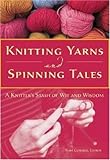I suppose I just haven't found much of interest to say lately. I'm well aware that there are only so many posts that readers can take about how I still haven;t finished knitting that blanket or still haven't finished a new book yet.
Well, no longer. I have finished reading something, and I'm going to review it!
I recently finished reading Eliane Leslau Silverman's The Last Best West, a book about women's lives on the Alberta prairie from 1880 to 1930. It's a book of compiled anecdotes from the many women she interview for the purpose of finding out just how their lives were at the time.
Why write a book specifically about what women did then? Silverman explains in the first part of the book that she grew tired of reading books about that era that were all about what men did. Politics, great discoveries, all that stuff is interesting, but she wanted to know more about the history of the woman who, for the most part, were behind the men, at home keeping things stable, doing the daily chores and routines that so many men really took for granted at the time.
I too had long been interested in domestic history, though I didn't know what it was called until recently. I wanted to know how people of various time periods really lived, what their daily humdrum lives were about. What did they do that I don't do? What do they do that I also do? Why do they do it? While the life of some impoverished composer or child genius was certainly interesting, it told me how only one tin slice of society behaved, and that was usually the upper class. And even then, it was a poor image of life at best.
So here was a chance for me to read about the lives and viewpoints of women during a historical period that particularly interests me. I couldn't pass it up!
The anecdotes selected were fascinating. They told about topics such as the isolation that drove women alternately to their wits end and then to form a community. They delved into those hidden mysteries of "growing up" and childbirth, and how sexuality was often hidden from them at all costs. They showed what it was like to live with abusive parents and husbands, what they were allowed to do and what they weren't, the religions they believed in and the mishmash of cultural practices they were all exposed to.
It's one thing to read about these things in some history book. But since this was a book of collected anecdotes, the words of women who sat down and told somebody about their lives, history become all the more real. History isn't something confined to dry pages in a thick textbook. It's people, people both living and dead, who were there and have their stories to tell. Sure, these woman may not have changed the world, may not have revolutionized much beyond the efficiency of their own household chores, but they were people nonetheless and I believe they have a right to have their stories told alongside the so-called "great people" of the time.
If you enjoy history, especially domestic history or women's history, I definitely recommend picking up this book if you have the chance. It makes the period and the place come alive again.

 ( Thoughts: )
( Thoughts: )
